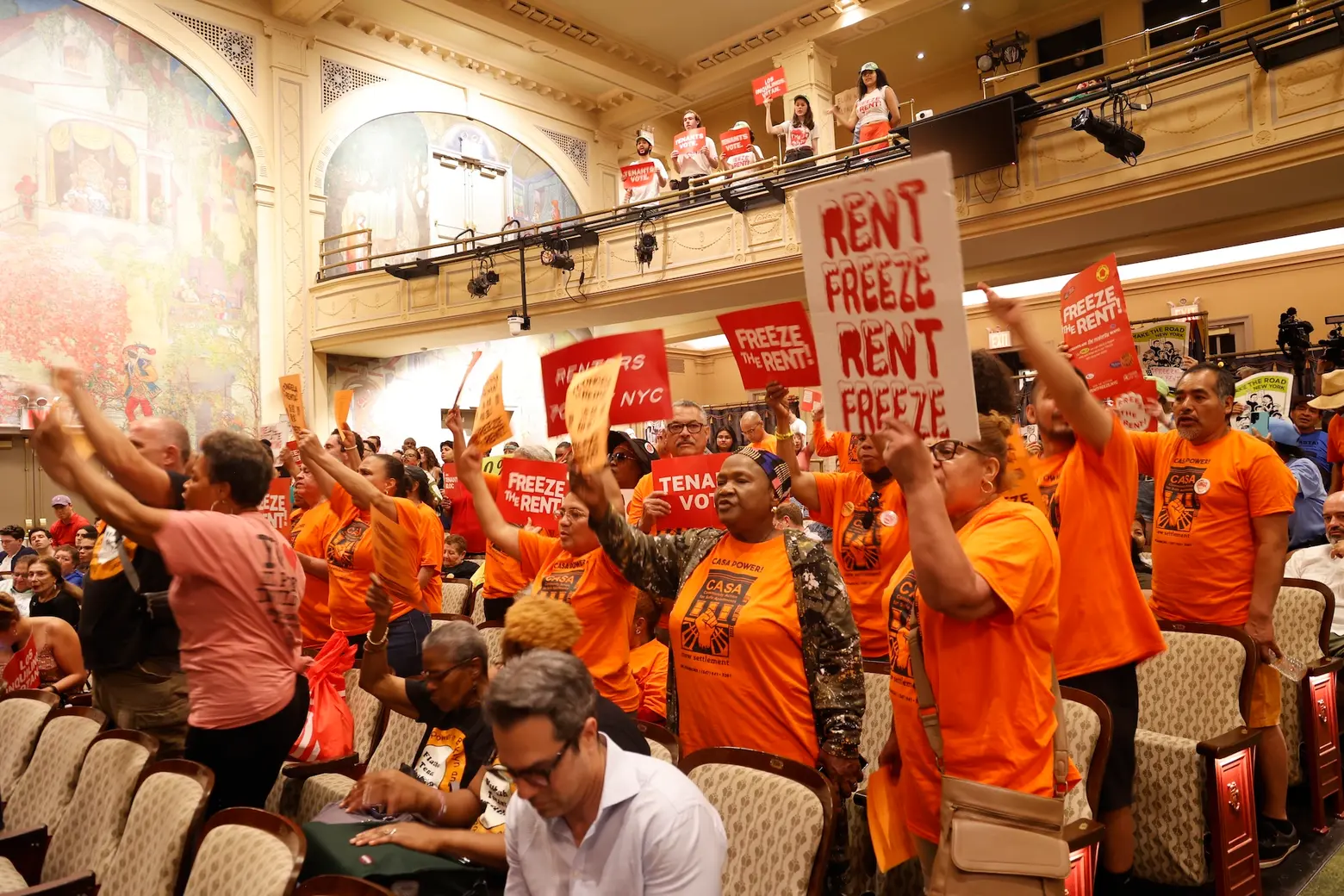Rent Guidelines Board approves increase up to 4.5 percent for stabilized apartments


Rent Guidelines Board final vote on June 30, 2025. Photo courtesy of New York State Tenant Bloc.
Rent for more than two million New Yorkers will increase for the fourth year in a row. The Rent Guidelines Board on Monday voted to raise rents for stabilized apartments by 3 percent for one-year leases and 4.5 percent for two-year leases that start on or after October 1. The vote comes less than a week after Assembly Member Zohran Mamdani’s win in the Democratic mayoral primary; Mamdani has pledged to direct the board to freeze the rent if elected in November.
The rent hike is the fourth approved by the Rent Guidelines Board in as many years. Appointed by the mayor, the nine-member board sets the annual lease adjustments for the city’s one million rent-stabilized apartments by looking at the economic conditions for landlords and tenants.
During Mayor Eric Adams’ tenure, the rent has gone up 12 percent for rent-stabilized units, a big change from the rents under former Mayor Bill de Blasio. De Blasio directed the board to freeze rent several times, and rents went up just 6 percent during his eight years as mayor.
But as Gothamist notes, for most of de Blasio’s tenure, landlords could raise rent by 20 percent on vacant apartments and remove them from the rent stabilization system once the rent hit a certain threshold. A 2019 state law strengthened tenant protections and outlawed vacancy decontrol.
This year’s rent increases fall in the range approved by the board in May, but after Mamdani’s win in the primary, there was another push from tenant advocates for the board to freeze rents instead.
According to an RGB report released this spring, the net operating income (NOI) for landlords across the city increased 12.1 percent between 2022 and 2023, the most recent data available, up from 10.4 percent the previous year. When adjusted for inflation, NOI rose 8 percent.
A study by the board examining year-to-year changes in housing affordability and tenant income found that cash assistance recipients increased by 16.2 percent, SNAP recipients increased by 3 percent, the unemployment rate rose to 5.3 percent, and average wages, when adjusted for inflation, decreased by 0.4 percent.
For landlords, the price index of operating costs (PIOC), which measures taxes, labor costs, fuel, utilities, maintenance, administrative costs, and insurance costs in rent-stabilized properties, has risen 6.3 percent between April 2024 and March 2025.
As usual, neither tenant groups nor landlords are happy with the board’s decision.
Ann Korchak, board president of the Small Property Owners of New York (SPONY), said the board failed small building owners.
“We needed rent increases proportional with the 6.3% surge in building operating costs presented in the RGB’s own reports. They didn’t follow the math, and now these rent adjustments will further plunge small rent-stabilized buildings into distress and foreclosure,” Korchak said in a statement.
“Capping rent increases when operating costs are rising is unsustainable. It’s time to seriously consider, in the future, separate, higher rent increases for apartment leases in small, economically distressed buildings with high numbers of rent-stabilized apartments.”
New York State Tenant Bloc called out Adams, who is running for reelection as an Independent, for “squeezing in one last rent hike for his real estate donors before tenants show him the door,” Cea Weaver, the group’s director, said in a statement.
“This will be the last rent hike New Yorkers ever see from a mayor bought and paid for by real estate,” Weaver said.
Mamdani is running on making New York more affordable, which includes promises to freeze the rent for stabilized apartments.
Adams, who never supported a rent freeze, asked the board to adopt the lowest increase in the proposed range. In a lengthy statement following the vote, the mayor called out Mamdani for pledging to freeze the rent while housing conditions worsen.
“Demands to ‘freeze the rent’ would exacerbate these harmful health and safety issues inside the homes of more than 1 million New Yorkers by depriving owners of the resources needed to make repairs — a cruel and dangerous proposal,” Adams said in a statement.
“While freezing the rent may sound like a catchy slogan, it is bad policy, short-sighted, and only puts tenants in harm’s way. As the mayor of this city, I will never choose a politically advantageous position over what I know in my heart to be best for New Yorkers.”
RELATED:
Interested in similar content?
Source link




